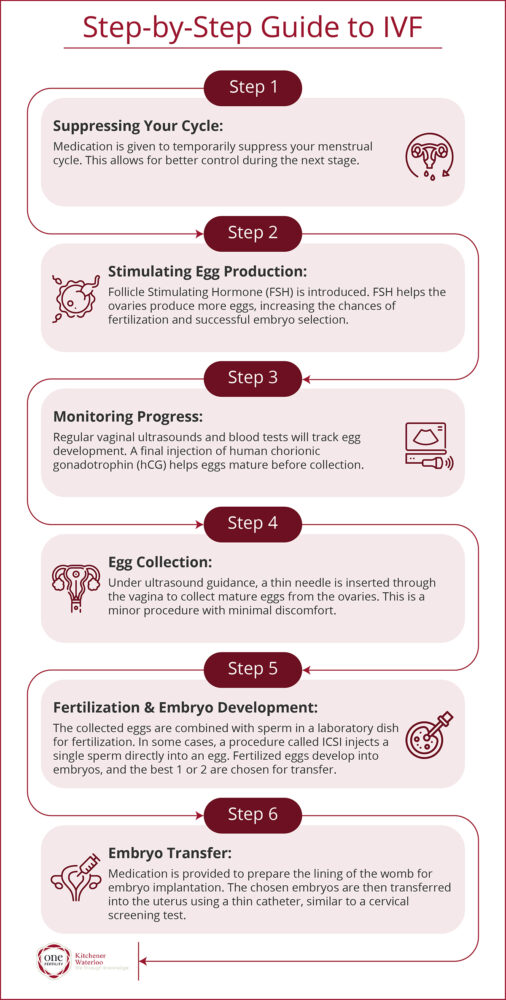For single people and couples alike, in vitro fertilization (IVF) in Ontario is more accessible now than ever before. We know the road to parenthood isn’t always easy and you may experience some bumps along the way. But with the proper support, seeking laboratory procedures with assisted reproductive technology, such as IVF may help improve your chances of having a successful pregnancy.
With the advancement of modern technology, in vitro fertilization offers a real possible opportunity for people to realize their dreams of having a family.
What Is IVF?
In vitro fertilization, commonly referred to as IVF, is a treatment for fertility or genetic issues. During this specialized process, several eggs are extracted from a woman’s ovary and are merged with collected sperm in a laboratory. The fertilized eggs grow to become embryos which, at this point, are then transferred into the uterus to implant.
When Should You Consider IVF Treatment?
The need in vitro fertilization can develop for a variety of reasons. Infertility may be the result of blocked or nonfunctional fallopian tubes, a decreased ovarian reserve, low sperm count, or from an advanced reproductive age.
IVF is also undertaken if there is a possibility of genetic mutation or if there is a need to have a surrogate. If an individual wants to have a family without a partner or if a same-sex couple is ready to have a baby, IVF may be the right solution.

The IVF Process
As we mentioned, IVF can be a long and complex journey regardless of the reason for this type of treatment. There are many factors that play a role in the success of an IVF procedure. From the initial consultation to the potential pregnancy, one IVF cycle can take up to six weeks. Here are some of the steps involve in IVF.
Birth Control Pills/Estrogen
Depending on the initial consultation and test results, the woman may require birth control or estrogen medication to control the menstrual cycle. It can also help to reduce the risk of ovarian cysts from developing.
Ovarian Stimulation
Ovarian stimulation is one of the longer stages of IVF treatment. Over 10 to 14 days, hormone injections are done daily to simultaneously stimulate the maturity of the eggs. During this time, the ovaries are monitored through blood tests and ultrasounds to supervise hormone levels and follicle growth. Any follicles more than 14 millimetres suggests a matured egg.
Once the eggs are determined to be of a specific size, a final injection, known as the “trigger shot” is administered. This shot is done exactly 36 hours before the scheduled egg retrieval appointment and stimulates the ovaries to release the mature eggs (ovulation).
Egg Retrieval
The egg retrieval is done under the careful hands of a specialist. The eggs are removed from the follicles one by one and placed in a solution within the controlled environment of an incubator.
Fertilization
At this point, the Intracytoplasmic Sperm Injection (ICSI) procedure is performed. This involves inserting the sperm into the eggs. While this lab technique does not guarantee a successful fertilization, the average success rate is 70%. The eggs that do become fertilized become an embryo.
Embryo Development and Transfer
The persistent monitoring continues over the next several days to measure the embryos development. This is done by a universal chart referred to as embryo grading. This tool helps specialists to distinguish which embryos to use, the transfer day, and the number of viable embryos.
The first measurement is taken on Day 3. At this time, it is referred to as cleavage stage embryos and is considered viable, or Grade A, with the appearance and six to 10 uniformed-size cells.
Day 5 embryos are blastocysts and undergo a more complex grading system. The appearance of the inner cell and the trophectoderm, and the degree of expansion are graded.
Once the embryos are ready, they will be transferred into the uterus. This procedure is comparable to a PAP test in respect to the sensation experienced and only takes approximately 10 minutes to complete.
Pregnancy Test
The IVF is successful once an embryo implants into the uterus lining. While this is an exciting and anxious time, it is recommended to wait for the results of the blood test performed by your fertility specialists. While it may seem like a lifetime, it’s best to wait nine to 14 days after the embryo transfer to take a pregnancy test.
IVF Risks You Need to Know
If you decide to try IVF treatment, it is important that you and your partner (if applicable) understand the associated risks with this procedure.
Due to the number of embryos developing, there is a risk for multiple babies which can stimulate premature labour. Any type of premature labour carries the risk of the baby, or babies, being born weeks in advance and/or at a low birth weight.
IVF also increases the risk of an ectopic pregnancy. This is a life-threatening condition for both baby and the mother as a fertilized egg implants outside of the uterus.
The egg retrieval portion of IVF treatment carries the same serious risks as any surgical procedure. Damage to one of the organs such as the bladder or bowel, infection, and bleeding can occur.
In rare cases, Ovarian Hyperstimulation Syndrome (OHSS), can be present with rapid weight gain, bloating, nausea, severe abdominal pain, vomiting, diarrhea, and urinary retention.
IVF Funding
The costs for IVF can run high, particularly if more than one treatment cycle is required. The Government of Ontario offers IVF funding in Kitchener, Cambridge, Guelph, and other cities to reduce costs. The public-funded financial program is available for one IVF treatment cycle per eligible party per lifetime.
To be eligible for the program, you must be an Ontario resident and have a valid provincial health card (OHIP). It is open to anyone receiving funded IVF services, regardless of your gender, sexual orientation, or family status.
About ONE Fertility Kitchener Waterloo and IVF Treatment
For a compassionate medical approach to your IVF treatment, ONE Fertility Kitchener Waterloo provides customized care plans to meet your physical, mental, and emotional needs. Our physicians, nurses, lab technicians, and administration team members offer advanced medical care based on science-based evidence. Contact us today to book a consultation with one of our esteemed fertility specialists.





